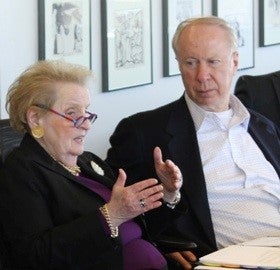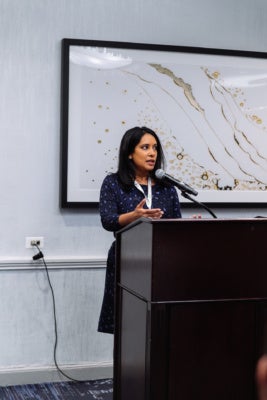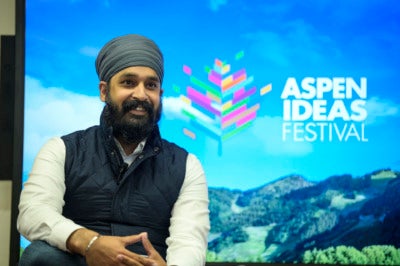About Us
Over the last ten years, we have grown from a small passion project with no full-time personnel to a program with an expansive vision, a wide network of partners, and a dedicated team. This is our journey.
The Beginning
In March 2011, the Aspen Institute’s Justice and Society Program, under the direction of Executive Director Meryl J. Chertoff, held a day-long conference, “America the Inclusive” in partnership with the Chicago-based InterFaith Youth Core (now Interfaith America). The meeting was called to address the increasingly polarizing religious rhetoric in America, particularly toward Muslims, which Chertoff saw as similar to the antisemitism seen during World War II. In 2012, largely due to the enthusiasm of participants in that initial conference, the Aspen Institute’s Inclusive America Project (IAP) was formed. The project aimed to be a high-level nonpartisan project focusing on five key sectors: youth development organizations, higher education, media, religiously affiliated organizations, and government agencies.
Inclusive America Project (IAP)

Former Secretary of State Madeleine Albright and Harvard Kennedy School professor David Gergen served as co-chairs and IAP brought together a distinguished panel of leaders in those five sectors for full-day meetings at the Aspen Institute headquarters in December 2012 and April 2013. Panelists collaborated to author Principled Pluralism, a white paper on proven strategies to increase respect for diverse religious identities in the public sphere, foster positive interfaith interactions, and form productive partnerships among people of different faiths in the service of the common good.
In the years to follow, IAP worked on additional publications such as Interfaith Engagement in West Michigan and Religious Diversity and Youth Development. These and other early publications continue to shape and inform our work.
A New Urgency

The intensified rhetoric of the 2016 election year moved Meryl Chertoff to dedicate more resources to the passion project she had kept alive alongside her main focus in the Justice & Society Program. She hired Zeenat Rahman (now the Executive Director of the University of Chicago’s Institute of Politics) to direct the project, and Allison K. Ralph, Ph.D., first as consulting editor and eventually as Assistant Director.
In February 2018, IAP released a new set of essays, Pluralism in Peril. This collection offers effective tools and strategies from community and interfaith leaders, philanthropists, and academics to build a more resilient, trust-based environment that fully incorporates American religious minorities. The collection also offers a vision for a truly pluralist future.
From 2018 to 2021, Zeenat and Allison developed a strategy focused on creating a national infrastructure to foster multi-stakeholder and cross-sector connections, with the ultimate aim of building and sustaining the field of religious pluralism. In October 2018, the project held its first multi-stakeholder gathering, which resulted in Conscience, Community and Citizenship, a report which provides takeaways on the specific skills and competencies needed to engage in a pluralistic and democratic society.
The Religion & Society Program

In mid-2021, IAP welcomed public scholar and champion of religious pluralism Dr. Simran Jeet Singh to the team as its new Executive Director. In 2022, the Inclusive America Project rebranded as the Aspen Institute’s Religion and Society Program. Together, these changes mark a new chapter in the Program’s pursuit of an inclusive, just, and equitable society.
Today, the Religion & Society Program envisions a society where religious and non-religious people thrive, respecting and engaging together across beliefs. The Program’s mission is to strengthen the understanding of religion’s role in advancing equity and the common good. By emphasizing network and community building, the Program is creating and amplifying connections that can break down barriers for generations to come.
A New Chapter (2024-Present)
Since 2024, the program has been led by Josh Good, who brings with him a wealth of experience in cultivating platforms at the nexus of faith and public life. Good, a public champion of religious pluralism, has a vision for this new chapter that is both expansive and grounded in the core principles of the Aspen Institute. Under his direction, RSP has deepened its commitment to building communities of practice and platforms that elevate leaders who are actively working to make a more pluralistic society possible.
The program’s work today is centered on three key initiatives, each designed to build a “dense, overlapping network” of leaders who share a common vision for a healthier society.
First, Faith Angle Forum continues its more than 25-year legacy of equipping mainstream journalists to better understand religion and its impact on the public square. Since 1999, Faith Angle has been convening top scholars and leading journalists for smart conversations around some of the most profound questions in American culture and public life. By inviting journalists away from the pressures of the newsroom, the forum provides a rare and appreciated opportunity for thoughtful candor and critical self-reflection.
The Aspen Religion & Philanthropy Initiative is a new, peer-led project that brings together senior staff executives from leading philanthropies to explore the “dividends of religious pluralism.” This initiative, which includes twice-annual convenings, addresses a critical blind spot in modern giving: the need to understand how faith can be a powerful force for social good. By creating a trusted network, we hope to foster greater collaboration and more informed giving in the religion sphere, helping to rebuild social trust one grant at a time.
Finally, the Aspen Religion Fellows program is designed to cultivate a new generation of high-impact, values-driven leaders. This 18-month, cohort-based program empowers individuals between the ages of 25 and 45 to harness the potential of religion in addressing contemporary societal challenges. Through immersive forums, leadership coaching, and a project grant, each fellow is equipped to translate abstract values and intellectual insights into concrete, measurable societal impact. It is a commitment to the long game, preparing a new crop of leaders who can help a diverse America flourish for years to come.
